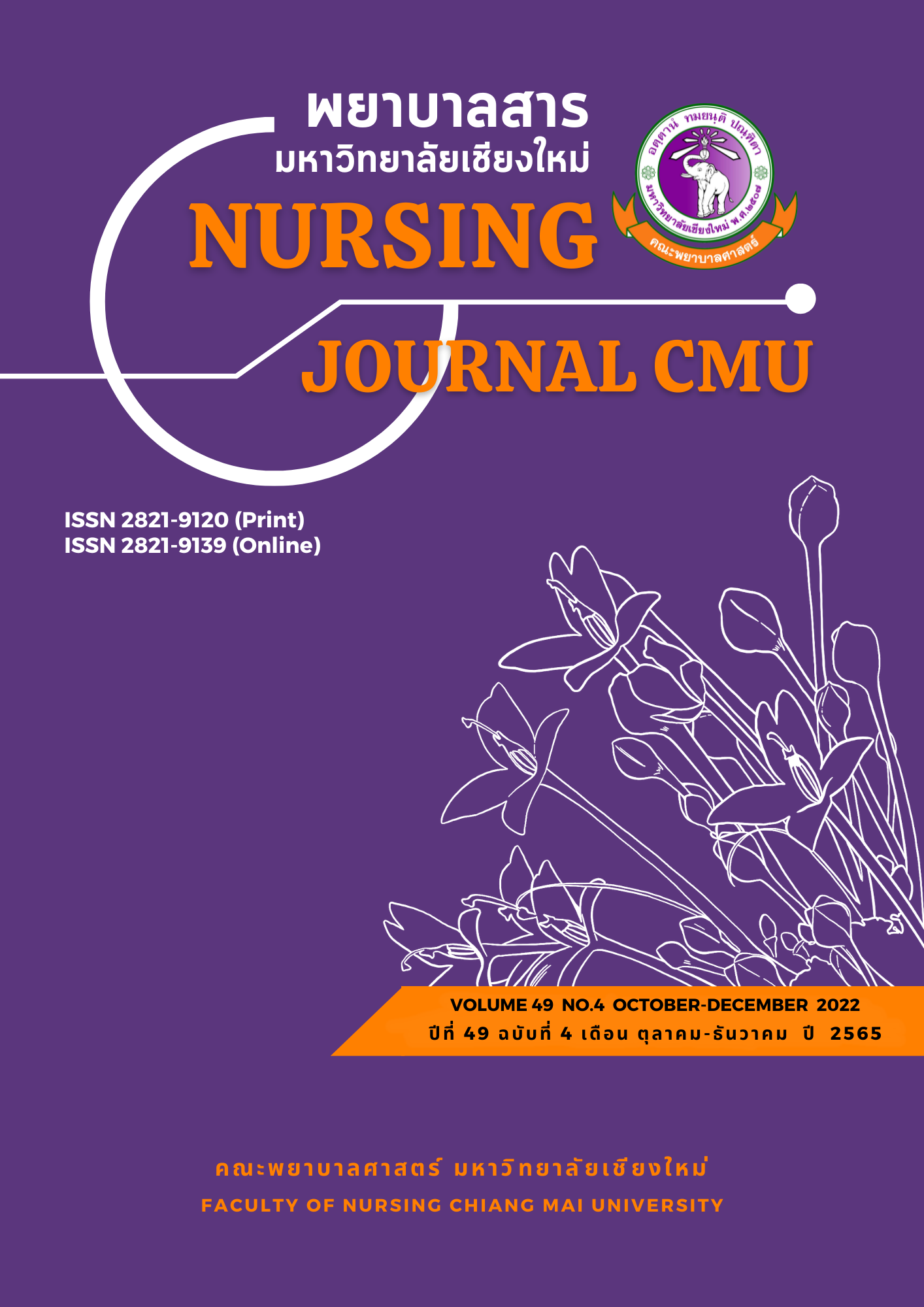Health Literacy and Self-Management Among Older Persons with Gastrointestinal Cancer
Keywords:
Health literacy, Self-management, Older Persons with Gastrointestinal CancerAbstract
Self-management among older persons with gastrointestinal cancer, to help them control symptoms and live with their disease, is influenced by various factors. This descriptive research aimed to study health literacy and self-management, and the relationship between health literacy and self-management in older persons with gastrointestinal cancer. The sample consisted of 88 older persons who were diagnosed with gastrointestinal cancer and registered at Phayao hospital. Data were collected using a questionnaire on the health literacy of elders with gastrointestinal cancer, with a Cronbach’s alpha coefficient of 0.85, and a questionnaire on the self-management of elders with gastrointestinal cancer, with a content validity index of 0.94 and a Pearson’s correlation coefficient of 0.89. The data were then analyzed using descriptive statistics and Pearson’s product-moment correlation coefficient.
The results showed that older persons with gastrointestinal cancer had a high level of health literacy and a good level of self-management. It was also found that health literacy and self-management showed a moderate positive correlation at a significant level (r = 0.352, p < .01).
The findings of this study can be used by health personnel for planning to promote health literacy and self-management in older persons with gastrointestinal cancer.
References
Al-Harithy, F. M., & Wazqar, D. Y. (2021). Factors associated with self-management practices and self-efficacy among adults with cancer under treatment in Saudi Arabia. Journal of Clinical Nursing, 30(21-22), 3301–3313. doi: 10.1111/jocn.15843
American Cancer Society. (2020). American cancer society guideline for colorectal cancer screening. Retrieved from https://www.cancer.org
Burns, N., & Grove, S. K. (2009). The practice of nursing research: Appraisal, synthesis, and generation of evidence (6th ed.). Philadelphia: Elsevier Saunders.
Busch, E. L., Martin, C., DeWalt, D. A., & Sandler, R. S. (2015). Functional health literacy, chemotherapy decisions, and outcomes among a colorectal cancer cohort. Cancer Control: Journal of the Moffitt Cancer Center, 22(1), 95-101. doi: 10.1177/107327481502200112
Chiang Mai Provincial Public Health Office. (2018). Health screening guide for the elderly. Retrieve from https://www.chiangmaihealth.go.th/cmpho_web/main_section.php? info_id=4197 (in Thai)
Department of Health Ministry of Public Health. (2014). Elderly screening/assessment manual. Nonthaburi: Office of the publishing house of the war veteran organization. (in Thai)
Department of Health Ministry of Public Health. (2017). Conceptual model of health literacy. Retrieve from http://planning.anamai.moph.go.th/download/D_DataMarts/Change/ HL.pdf (in Thai)
Ishikawa, H., Takeuchi, T., & Yano, E. (2008). Measuring functional, communicative, and critical health literacy among diabetic patients. Diabetes Care, 31(5), 874-879.
Lorig, K. R., & Holman, H. R. (2003). Self-management education: History, definition, outcomes, and mechanisms. Annals of Behavioral Medicine, 26(1), 1-7.
National Cancer Institute. (2020). Report on cancer registration at the hospital Level 2019. Retrieve from https://www.nci.go.th/e_book/hosbased_2563/index.html (in Thai)
Noppakroh, J., Chintanawat, R., & Khampolsiri, T. (2020). Health literacy and self-management in older persons with type 2 diabetes mellitus. Nursing Journal, 47(2), 251-261. (in Thai)
Nutbeam, D. (2000). Health literacy as a public health goal: A challenge for contemporary health education and communication strategies into the 21st century. Health Promotion International, 15(3), 259-267.
Papadakos, J. K., Hasan, S. M., Barnsley, J., Berta, W., Fazelzad, R., Papadakos, C. J., … Howell, D. (2018). Health literacy and cancer self-management behaviors: A scoping review. Cancer, 124(21), 4202-4210. doi: 10.1002/cncr.31733
Pfeiffer, E. (1975). A short portable mental status questionnaire for the assessment of organic brain deficit in elderly patients. Journal of the American Geriatrics Society, 23(10), 433-441.
Polit, D. F., & Beck, C. T. (2016). Nursing research: Generating and assessing evidence for nursing practice. Baltimore: Lippincott Williams & Wilkins.
Rattanawarang, W., & Chantha, W. (2018). Health literacy of self-care behaviors for blood glucose control in patients with type 2 diabetes, Chai Nat Province. The Journal of Baromarajonani College, 24(2), 34-51. (in Thai)
Ruangsawat, S., Soivong, P., & Suksatit, B. (2020). Factors related to self-management behaviors among persons with cirrhosis. Journal of Health and Nursing Research, 36(3), 123-132. (in Thai)
Srirung, W., Puwarawuttipanit, W., & Koositamongkol, S. (2022). Factors influencing self-management behavior among ischemic stroke patients. Nursing Science Journal of Thailand, 40(2), 108-123. (in Thai)
Syed, I. A., Nathan, P. C., Barr, R., Rosenberg-Yunger, Z. R., D’Agostino, N. M., & Klassen, A. F. (2016). Examining factors associated with self-management skills in teenage survivors of cancer. Journal of Cancer Survivorship, 10(4), 686-691. doi: 10.1007/s11764-016-0514-y
Wu, F., Howell, D., Fang, Q., Chen, J., & Yuan, C. (2020). Trajectory patterns and factors influencing self-management behaviors in Chinese patients with breast cancer. Cancer Nursing, 43(2), e105-e112. doi: 10.1097/ncc.0000000000000681
Downloads
Published
How to Cite
Issue
Section
License
Copyright (c) 2022 Nursing Journal

This work is licensed under a Creative Commons Attribution-NonCommercial-NoDerivatives 4.0 International License.
บทความที่ได้รับการตีพิมพ์เป็นลิขสิทธิ์ของวารสารพยาบาลสาร
ข้อความที่ปรากฏในบทความแต่ละเรื่องในวารสารวิชาการเล่มนี้เป็นความคิดเห็นส่วนตัวของผู้เขียนแต่ละท่านไม่เกี่ยวข้องกับมหาวิทยาลัยเชียงใหม่ และคณาจารย์ท่านอื่นๆในมหาวิทยาลัยฯ แต่อย่างใด ความรับผิดชอบองค์ประกอบทั้งหมดของบทความแต่ละเรื่องเป็นของผู้เขียนแต่ละท่าน หากมีความผิดพลาดใด ๆ ผู้เขียนแต่ละท่านจะรับผิดชอบบทความของตนเองแต่ผู้เดียว






